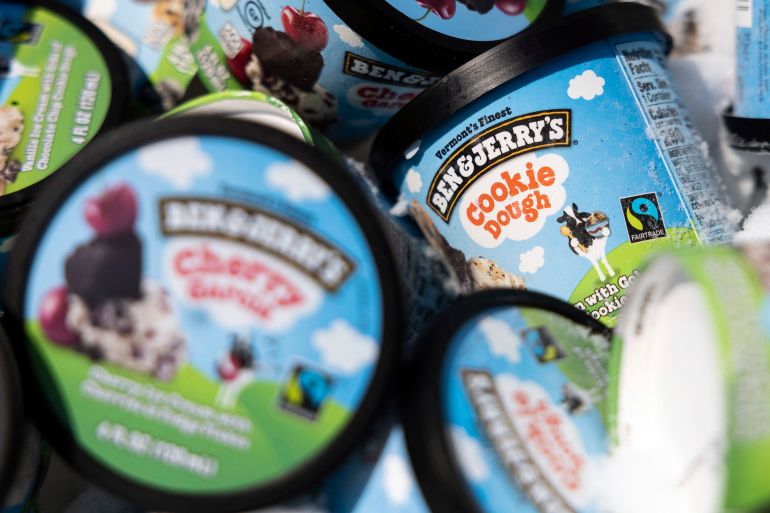Unilever sells local Ben & Jerry’s business to Israeli firm
Deal means that the ice cream will be sold in settlements in occupied Palestinian land, despite the brand’s opposition.

Multinational consumer goods company Unilever has sold its Ben & Jerry’s ice cream business in Israel to its local licensee for an undisclosed sum, after the United States brand announced last year that it would stop marketing products in Israeli-occupied Palestinian territories, saying it was “inconsistent” with its values.
Under the new arrangement, announced on Wednesday, Ben & Jerry’s ice cream will be available to all consumers in Israel and the occupied West Bank, including in Jewish settlements.
Keep reading
list of 3 itemsIsrael expels Human Rights Watch official for BDS support
As Israel bombards Gaza, BDS urges renewed economic pressure
Ben & Jerry’s expressed its disagreement with its parent company’s decision, saying that, despite the company no longer profiting from Ben & Jerry’s ice cream sold in illegally-occupied territories, their position had not changed.
“We continue to believe it is inconsistent with Ben & Jerry’s values for our ice cream to be sold in the Occupied Palestinian Territory,” the company said on Twitter.
We are aware of the Unilever announcement. While our parent company has taken this decision, we do not agree with it.
(🧵1/3)
— Ben & Jerry's (@benandjerrys) June 29, 2022
Ben & Jerry’s Jewish founders, Ben Cohen and Jerry Greenfield, no longer manage the brand but are well known for their commitment to social justice, with recently expressed strong support for the Black Lives Matter movement, LGBTQ+ rights and electoral campaign finance reform.
The episode has highlighted the challenges facing consumer brands that have backed progressive causes and attempted to also take a stand on Israel’s occupation of Palestinian land, such as San Francisco-based Airbnb, which in 2019 reversed its decision to delist Israeli settlements.
The international boycott, divestment and sanctions (BDS) movement seeks to end international support for Israel’s occupation of Palestinian territory, and advocates for freedom, justice, and equality for Palestinians, as well as for Israel to comply with international law.
However, Israel says such boycotts are discriminatory and anti-Semitic.
On Wednesday, Israel’s foreign ministry called the Ben & Jerry’s deal “a huge victory”.
“We will fight delegitimisation and the BDS campaign in every arena, whether in the public square, in the economic sphere or in the moral realm,” Israel’s foreign minister, Yair Lapid, said in a statement.
Last year, Israel condemned the sales boycott as “morally wrong” and said Unilever would face “severe consequences”. The consumer goods giant defended Ben & Jerry’s autonomy, but said it was “fully committed” to Israel and would find a solution by the end of this year.
The new owner is the brand’s longtime Israeli ice cream licensee Avi Zinger, owner of American Quality Products. Zinger had sued Ben & Jerry’s after its decision in the occupied West Bank, saying the company illegally severed their 34-year relationship.
“The new arrangement means Ben & Jerry’s will be sold under its Hebrew and Arabic names throughout Israel and the West Bank under the full ownership of its current licensee,” Unilever said.
Reactions
The decision to sell Ben & Jerry’s ice cream to local licensee has led to heated reactions.
“The return of Ben & Jerry’s to Israeli settlements, which were built on Palestinian land, exposes it to international legal accountability and its name will be on the United Nations blacklist of companies operating in settlements,” the Palestine Liberation Organization’s Wasel Abu Yussef said.
Omar Shakir, Israel and Palestine Director at Human Rights Watch, said the deal sought to undermine the “principled decision” to stop selling the ice cream in Israeli settlements.
“What comes next may look and taste similar, but, without Ben & Jerry’s recognised social justice values, it’s just a pint of ice cream,” he said in a statement.
Sari Bashi, Human Rights Watch’s Program Director, said that the decision “helps sustain discrimination and unlawful land grabs” against Palestinians.
Hey Unilever! Selling ice cream in Israeli-only settlements in the occupied West Bank helps sustain discrimination & unlawful land grabs. You're not promoting peace. You're contributing to serious abuses, including the crime against humanity of apartheid https://t.co/fSQ7HMTW98
— Sari Bashi (@saribashi) June 29, 2022
Officials in at least six US states had restricted or sold Unilever stock or bonds to protest Ben & Jerry’s decision, among them New York State Comptroller Thomas DiNapoli, Texas State Comptroller Glenn Hegar, and Arizona Treasurer Kimberly Yee. Representatives for all three have now said they would review Unilever’s move.
Billionaire activist investor Nelson Peltz, who is joining the board of Unilever next month, was involved in the discussions to bring about the resolution, said Rabbi Abraham Cooper, associate dean of the Simon Wiesenthal Center, a human rights organization that supported the deal. Peltz is the chairman of the centre’s board of governors.
Peltz met with Unilever CEO Alan Jope in September to discuss the situation before Trian Partners, the investment fund Peltz runs, bought any shares, a person familiar with the matter said.
Trian Partners commended the new arrangement in a statement, saying that “respect and tolerance have prevailed.”
Unilever had said previously it did not support the BDS movement, and reiterated that stance in a statement on Wednesday.
BDS supporters argue that the movement is necessary as political leaders have failed to end what the movement describes as “Israel’s settler-colonialism, ethnic cleansing and apartheid practices”.
However, BDS argues that it targets institutions on the grounds of complicity in human rights violations and explicitly opposes all forms of racism, but does not target individuals based on ethnicity or nationality. Its goal is to put end to Israel’s entrenched system of racial discrimination and ethnic privilege.